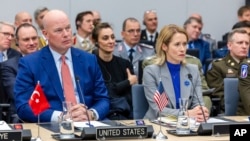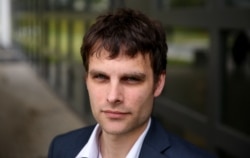
Welcome to Wider Europe, RFE/RL's newsletter focusing on the key issues concerning the European Union, NATO, and other institutions and their relationships with the Western Balkans and Europe's Eastern neighborhoods.
I'm RFE/RL Europe Editor Rikard Jozwiak, and this week I'm drilling down on one thing: my take from Tallinn and the road ahead.
The Briefing: From Tallinn To The Hague: The Run-Up To The NATO Summit
On May 13, a Russian military jet violated Estonian and NATO territory for close to a minute after the Estonian Navy made an attempt to intercept a flag-less tanker, named Jaguar, thought to belong to the Kremlin's so-called shadow fleet transporting EU-sanctioned oil to and from Russia. The Sukhoi Su-35 was deployed to protect the vessel that later returned to the Russian port of Primorsk.
The incident was the first reported breach of Estonia's airspace since 2022 and somewhat indirectly set the tone for the Lennart Meri conference in Tallinn on May 16-18.
The Baltic state's largest annual think tank event was full of Western officials putting on a brave face when discussing the state of the war in Ukraine, Russian threats to the rest of the continent, and the United States' increasingly thorny relations with Europe.
The American Presence In Europe
Perhaps the most eagerly anticipated appearance was that of Matthew Whitaker, US President Donald Trump's newly appointed ambassador to NATO, especially with so many worries, notably in eastern flank countries like Estonia, over American commitment to the military alliance.
Seemingly hanging on to every word he said, most people in the room appeared relieved that he ticked most boxes. Yes, NATO is "the greatest alliance in world history." And yes, Russia is the security threat to the organization. He seemed to comprehend the argument, put to him by Polish Foreign Minister Radoslaw Sikorski, that if the Europeans will splash the cash on the defense, quite a lot of it will be spent on European arms companies as Europeans also have an electorate and workforce to satisfy.
Refusing to be drawn into discussion about his boss's designs on Greenland, he simply noted that Denmark, which the giant island belongs to, is "a great NATO ally" but that bilateral relations weren't his responsibility.
Then there was the whole issue of the American force posture review, which will happen in the latter half of the year. There is plenty of speculation among diplomats that Washington will cut down on troops in Europe and boost its presence in the Indo-Pacific theater instead.
Whitaker noted that nothing had been determined yet and that allies will be consulted on the process. He also promised everything would be orderly, meaning the United States would "ensure that there are no security gaps."
Did that reassure nervous NATO members bordering Russia? Not really, but those diplomats I spoke to were still defiant, pointing out that the United States could also remove soldiers from the western part of the continent to the eastern one as it's cheaper to maintain their presence there and it offers good exercise conditions.
Another one tried to sound reassuring by arguing that the US flag -- meaning any presence -- was still better than the actual number of boots on the ground.
The Hague (No) Show?
Otherwise much of the discussion in Estonia focused on the upcoming NATO summit at The Hague at the end of June. While the previous two summits, in Vilnius back in 2023 and Washington a year later, were all about Ukraine and the haggling about whether Kyiv should get a NATO membership invite and how to phrase the country's eventual path into the club, the war-torn country will now be almost absent from the discussions.
There is still not even confirmation that Ukrainian President Volodymyr Zelenskyy will be invited to the Netherlands after being the star guest at previous gatherings.
Whitaker did, however, note that he expected him to be present. The Estonian foreign minister, Margus Tsahkna, pointed out that it would be "a major stratcom mistake" if he didn't come as that would be all the media would write about from the gathering.
But forget any invitations or any other language on Ukraine's future place in the alliance, especially since Trump has seemingly ruled out Kyiv joining anytime soon. In fact, Ukraine may not be mentioned at all in the final summit declaration.
One European official told me it's probably better for now as any attempts to negotiate about it would probably make the text worse for Ukraine than the 2024 Washington summit declaration, which at least states that NATO "will continue to support it on its irreversible path to full Euro-Atlantic integration, including NATO membership."
The same dilemma is true for any wording on Russia, so Moscow simply might not be mentioned at all. In fact, the entire text might just be a few paragraphs, compared to nearly 40 from last year that covered all manner of topics.
Instead, the summit, which now has been shortened from three to two days, will focus on ramping up European defense spending and building up a transatlantic defense industrial base, according to NATO Deputy Secretary-General Radmila Sekerinska.
The main headline will be the commitment by the 32 allies to reach 5 percent of GDP on defense spending, up from the current target of 2 percent. They should also dedicate 3.5 percent to "hard targets" such as arms and artillery, and the remaining 1.5 percent to cyberdefense, investment in military mobility, and the like.
But of course, all eyes will be on Trump, both in the Netherlands and in the run-up. Despite the fact that the much-hyped first direct Russia-Ukraine meeting in three years in Ankara last week turned into a lower-level nothing burger in which Moscow only repeated its "maximalist" positions of land grabs and Ukrainian neutrality, most people in Tallinn still cautiously think a cease-fire of some sort is possible in the run-up to the NATO summit.
Trump, Putin, Cease-Fire
The expectation is that Trump and Putin will eventually meet. They spoke on the phone once again on May 19, but there are clear European fears about what Trump might agree to in such a setting.
No one I spoke to believes Trump is truly serious about imposing hard-hitting measures on the Kremlin. Republican lawmaker Lindsey Graham proposed imposing 500 percent tariffs on countries that buy Russian oil, and there has been talk of other "secondary sanctions" hitting countries like Belgium, the Netherlands, and Spain, which import a lot of Russian liquefied natural gas.
I also sensed a fear among officials that reestablishing US-Russia bilateral relations, including striking some sort of trade and investment deal, is more important to both sides than actually having a lasting peace deal in Ukraine. The almost universal assessment I heard is that Putin is playing "the long game" over Ukraine, and while the Ukrainian lines won't breach anytime soon, he thinks he is winning. Or as one official put it: "Ukraine and Russia are in fact both losing, but Russia is losing more slowly."
This all puts Europe in a bind. I've heard Paris is mulling reestablishing a direct line with the Kremlin. "The Americans cannot be the only ones speaking to them," as one official put it. But no official meeting with Moscow is in the making.
When asked at a panel discussion whether it was time to have another NATO-Russia Council (NRC), a dormant political format since 2022, the answer from both Tsahkna and Sikorski was an emphatic "no" with the latter adding: "It was an instrument in times of peace which limited troops in eastern flank states. As long as Putin is president, we cannot trust that country."
More Sanctions?
So, Europe will continue to push for more sanctions for now. Its 17th package, probably the bloc's puniest yet, will be officially agreed on May 20, and there is already work on the next one, which will contain more blacklistings, including both Russian entities and individuals but also vessels thought to belong to the shadow fleet.
There might also be sanctions against more Russian banks and against Nordsteam 1 and 2, which are no longer operational but still aren't officially targeted. There is also a desire from the Europeans for the Group of Seven summit in Canada next month to lower the oil price cap for Russia from the current $60 per barrel to at least $50.
However, EU officials I spoke to don't believe all of the measures will pass, notably as Hungary can continue to be a spoiler. Most are also worried that the sanctions rollover in July will still be a proper struggle with alternative solutions being studied, for example, not to allow Russian frozen assets in the bloc to expire.
The Dilemma
But the threat from Russia will still be there. And the Europeans, while saying they're ready to stand up to Moscow even without American help, are wary.
The reassurance force meant for Ukraine once there is a cease-fire probably won't be particularly reassuring. European army officials have admitted they lack the long-strike capabilities of the United States and notably its supreme intelligence, surveillance, and reconnaissance capabilities.
And time is short. An assessment earlier this year from the Danish intelligence service claimed Russia could be capable of starting a major war in Europe (outside of Ukraine) within five years. But the Europeans might have to be ready well before that. Onno Eichelsheim, chief of defense for the Netherlands armed forces, told the Lennart Meri conference crowd that "Russia can give us 'a dilemma' already within a year after a potential end of the fighting in Ukraine."
What that dilemma might be, he didn't specify. But as Estonia experienced with the airspace violation earlier in the week, all options appear to be on the table.
Looking Ahead
EU enlargement is stuck for Ukraine and Moldova as well as most candidate countries in the Western Balkans for various political reasons. But there is one country that appears to be rapidly marching toward Brussels and EU membership right now: Albania.
On May 22, the country will start negotiations on another eight EU accession chapters (there are 33 in total), and it comes just a month after it opened another batch of chapters. The key going forward for Tirana will be to actually close negotiations on these chapters, which is much harder than opening them.
Feel free to reach out to me on X @RikardJozwiak, or on e-mail at jozwiakr@rferl.org.
Until next time,
Rikard Jozwiak
If you enjoyed this briefing and don't want to miss the next edition subscribe here.

